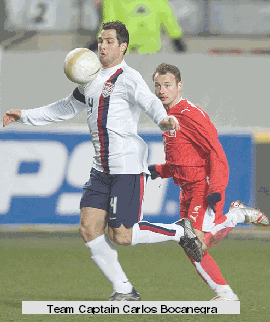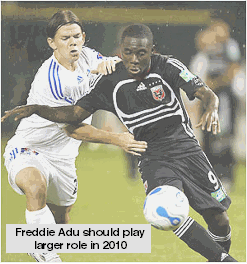|
The "New York Yankees" of soccer are again warming up for a serious Cup run. Spots are quite secure for European powerhouses: Northern Ireland, Germany, Spain, England, France, Italy, and Netherlands. South American juggernauts Argentina, Chile, Uruguay, Paraguay, and Brazil are primed for a Cup run.
If you are wondering why I am only mentioning those two categories it is because all eighteen World Cup winners are from them. Nine of the winners are from South America (Brazil has won five, Argentina and Uruguay two each), nine from Europe (Italy has won four, (West) Germany three, and England and France one each).
The U.S. received a bye for round one competition and defeated Barbados 8-0 and 1-0 in round two. Round three saw the U.S. in a four team group (with Trinidad and Tobago, Guatemala, and Cuba) with the top two advancing. The U.S. posted an impressive 5-1 mark in the home-and-home series with the three teams. They swept Guatemala 1-0 and 2-0, and Cuba 1-0 and 6-1; while splitting the two with Trinidad and Tobago 3-0 (at Bridgeview) and 1-2 (at Port of Spain).
The U.S. and Trinidad and Tobago advanced to round four along with the top two finishers of the other two groups of round three: Honduras, Mexico, Costa Rica, and El Salvador. The six teams will participate in a home-and-home with each opponent. Currently the U.S. has two wins, one draw, and no losses. They hosted and defeated Mexico and Trinidad and Tobago and earned a draw at El Salvador. Their remaining seven games are as follows: June 3 @ Costa Rica, June 6 Honduras, August 12 @ Mexico, September 5 El Salvador, September 9 @ Trinidad and Tobago, October 10 @ Honduras, and October 14 Costa Rica.
Look for the U.S, Mexico, and Costa Rica to claim the three automatic bids. El Salvador should place 4th and face off against 5th place Argentina, with Argentina advancing to the Cup.
.
|
|





